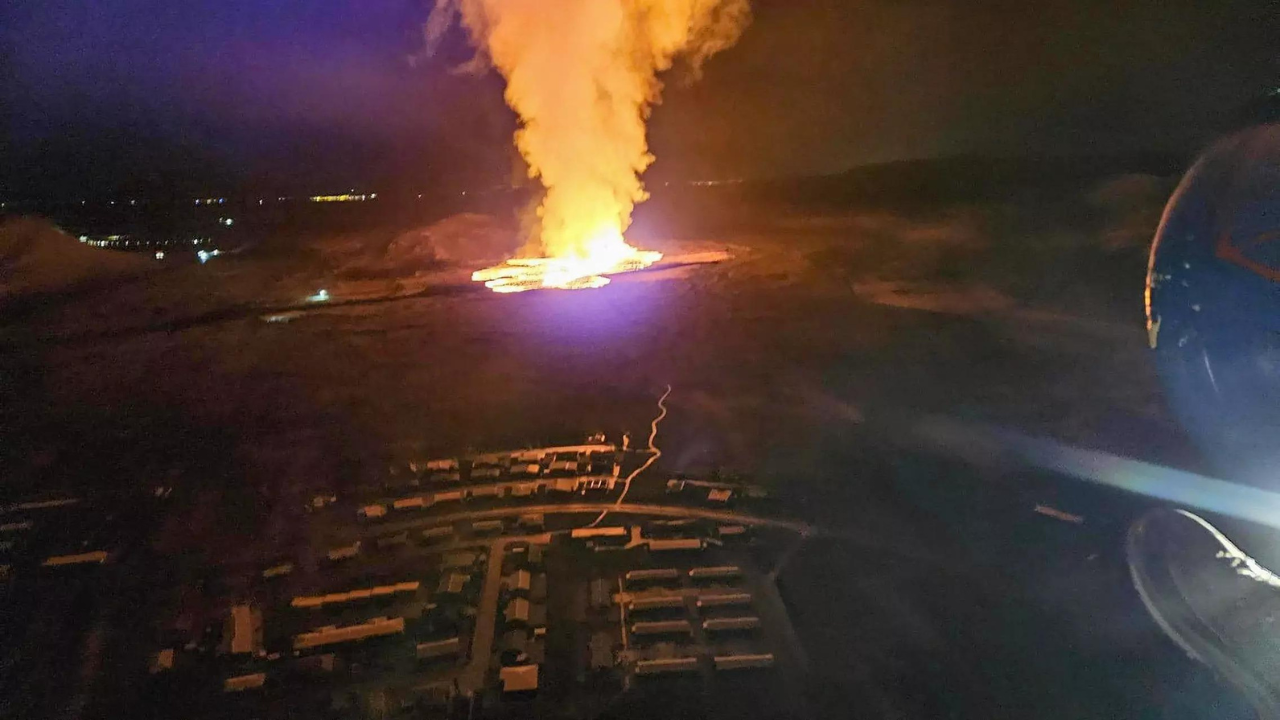[ad_1]
REYKJAVIK: Residents of the Icelandic fishing town of Grindavik are facing a second evacuation as new volcanic fissures have opened nearby, prompting the National Commissioner of Police to issue an evacuation order, CNN reported.
Grindavik, situated approximately 70 kilometres southwest of Reykjavik on the Reykjanes peninsula, had previously been evacuated in November due to heightened seismic activity that culminated in a volcanic eruption, emitting lava and massive plumes of smoke.
The town, renowned for the iconic Blue Lagoon, a popular tourist attraction featuring steaming geothermal water, is now under renewed threat. The Civil Protection Agency announced on Saturday that the evacuation order would likely be in effect for the next three weeks, with exceptions only for essential official activities or brief periods for residents to salvage valuables.
The Icelandic Meteorological Office, in its latest assessment, raised concerns about the increased risk associated with volcanic fissures, leading to the decision to evacuate. The hazard assessment indicated that dwelling in Grindavik was no longer justifiable for public safety. The magma level had reached a point similar to the previous eruption in December, but there was a heightened risk of migration further south, potentially reaching the town, as reported by CNN.
Iceland, home to 32 active volcanoes, sits on a tectonic plate boundary, resulting in constant geological activity. Despite the frequency of volcanic eruptions, they often occur in uninhabited areas. The country declared a state of emergency in November due to the escalating volcanic activity.
Comparisons were made to the 2010 Eyjafjallajokull volcano eruption, which caused widespread chaos by spewing ash clouds that led to the cancellation of approximately 100,000 flights, affecting around 2 million people. Experts, however, believe that the current series of eruptions is unlikely to cause similar disruptions, as it is not expected to involve glacial ice, a key factor in the 2010 event.
The Bardarbunga volcanic system, located in the centre of Iceland, experienced a significant eruption in 2014, covering 84 square kilometres with lava but causing no damage to nearby communities.
While the current situation in Grindavik raises concerns, authorities remain hopeful that the impact will be less severe than past volcanic events, emphasising the importance of prioritising public safety in the face of natural disasters, CNN reported.
Grindavik, situated approximately 70 kilometres southwest of Reykjavik on the Reykjanes peninsula, had previously been evacuated in November due to heightened seismic activity that culminated in a volcanic eruption, emitting lava and massive plumes of smoke.
The town, renowned for the iconic Blue Lagoon, a popular tourist attraction featuring steaming geothermal water, is now under renewed threat. The Civil Protection Agency announced on Saturday that the evacuation order would likely be in effect for the next three weeks, with exceptions only for essential official activities or brief periods for residents to salvage valuables.
The Icelandic Meteorological Office, in its latest assessment, raised concerns about the increased risk associated with volcanic fissures, leading to the decision to evacuate. The hazard assessment indicated that dwelling in Grindavik was no longer justifiable for public safety. The magma level had reached a point similar to the previous eruption in December, but there was a heightened risk of migration further south, potentially reaching the town, as reported by CNN.
Iceland, home to 32 active volcanoes, sits on a tectonic plate boundary, resulting in constant geological activity. Despite the frequency of volcanic eruptions, they often occur in uninhabited areas. The country declared a state of emergency in November due to the escalating volcanic activity.
Comparisons were made to the 2010 Eyjafjallajokull volcano eruption, which caused widespread chaos by spewing ash clouds that led to the cancellation of approximately 100,000 flights, affecting around 2 million people. Experts, however, believe that the current series of eruptions is unlikely to cause similar disruptions, as it is not expected to involve glacial ice, a key factor in the 2010 event.
The Bardarbunga volcanic system, located in the centre of Iceland, experienced a significant eruption in 2014, covering 84 square kilometres with lava but causing no damage to nearby communities.
While the current situation in Grindavik raises concerns, authorities remain hopeful that the impact will be less severe than past volcanic events, emphasising the importance of prioritising public safety in the face of natural disasters, CNN reported.
[ad_2]
Source link


